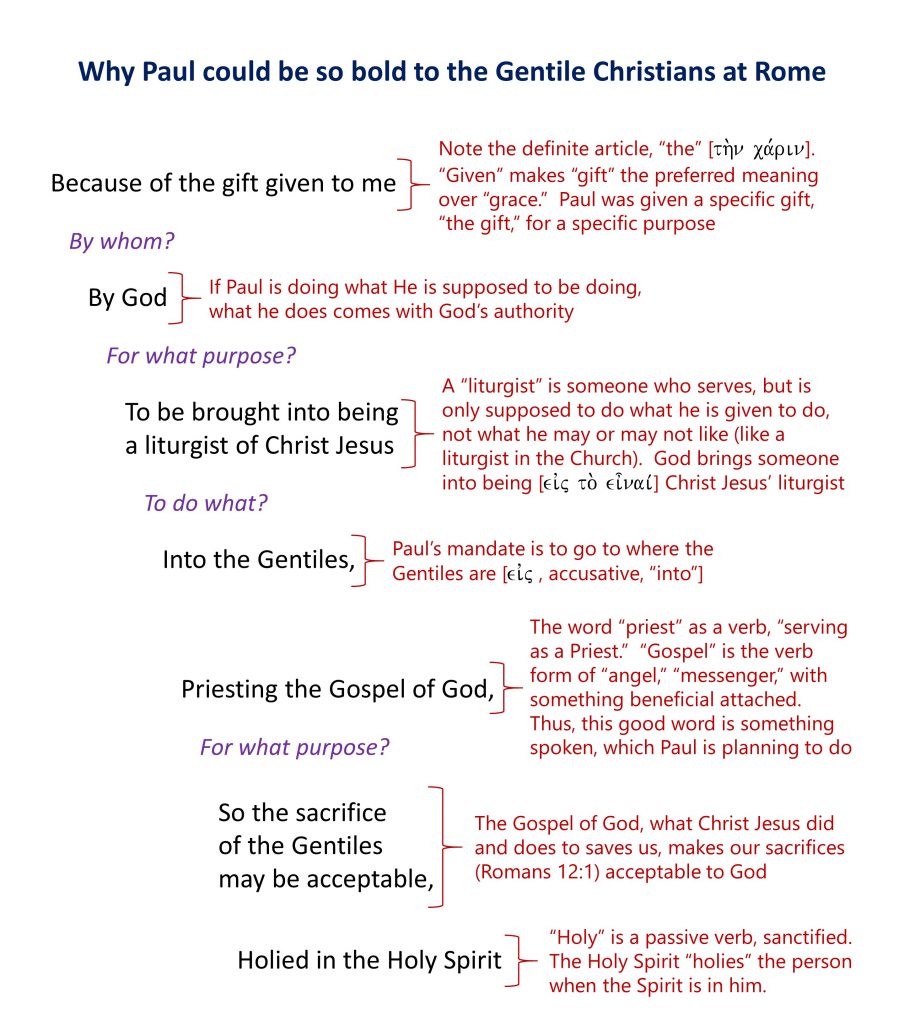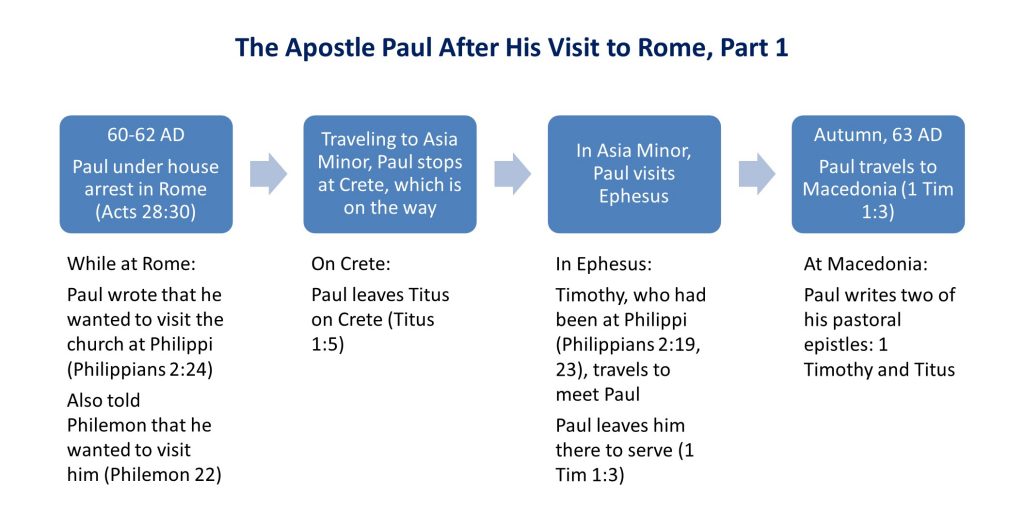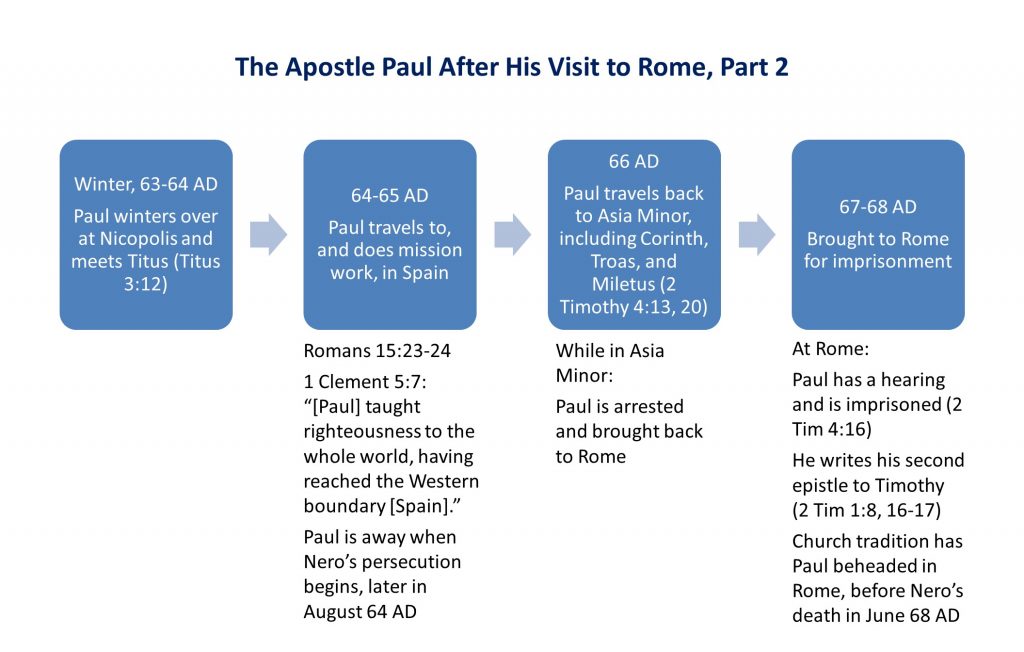 By finishing with the hope the Christian has, the resurrection of the body, given to him by faith through the Holy Spirit, Paul begins his conclusion. What he does, which we may consider is unusual, is he includes two conclusions.
By finishing with the hope the Christian has, the resurrection of the body, given to him by faith through the Holy Spirit, Paul begins his conclusion. What he does, which we may consider is unusual, is he includes two conclusions.
The first is for the “stronger brother,” the Gentiles (Romans 14:15-21). (His conclusion for the “weaker brother” will follow later in Romans, chapter 16.) Paul’s words of correction came earlier, so here he encourages the Gentile Christians, most of whom he does not know.
A Recapitulation of Themes
At the start of his letter, Paul mentioned four items:
- His apostleship to the Gentiles (1:1, 5),
- the Gospel of Jesus Christ (1:2-4),
- the faith and spiritual gifts of the Roman Christians (1:8, 11-12), and
- his eagerness to go to Rome (1:10, 11, 13, 15).
We find the same topics is his conclusion to the Gentiles.
Read Romans 15:14
- How are the Gentile Roman Christians at their best?
Read Romans 15:15-16
- If the Gentile Christians are “filled with all knowledge and able to instruct,” then why did Paul do what he wrote in vs. 15?
- Paul’s bold words of earlier censure were in service to what?
- What does this reveal about the function of the Law?
- By referencing God, Christ Jesus, and the Holy Spirit in work of the Christian, what does Paul reveal about these three?
- What purpose may Paul have for the Jewish Christians by using Old-Covenant terms and imagery, in a New-Covenant context?
Read Romans 15:17
- Why can Paul “be proud”?
“Proud”: The ESV does well to retain the noun of the original Greek. What is lost is Paul’s use of “boasting” as a noun. The ESV’s “proud” keeps us from connecting what he earlier said about “boasting.” Here, Paul “has boasting in Christ.”
- Romans 3:27: Then what becomes of our boasting? It is excluded. By what kind of law? By a law of works? No, but by the law of faith.
- Romans 4:2: For if Abraham was justified by works, he has something to boast about, but not before God.
Paul brings into fullness the difference between good boasting and bad boasting.
Bad boasting is based on what we do or who we are apart from Christ, which is only to our ruin. (See Rom 4:2. Also, 1 Cor 1:28-29, 3:21-23; 2 Cor 10:13; Eph 2:9.)
Good boasting: This is Christ being our boast, in what we have been given (1 Corinthians 3:21), and boasting in the Lord. (Rom 15:17. Also, 1 Cor 1:31, 2 Cor 10:17.)
Read Romans 5:18-19
Paul just mentioned Jesus Christ is his boast. We now see what that looks like.
- What does one speak if Christ is his boast?
- What did Christ accomplish through Paul, so far?
“obedience of the Gentiles”: Greek, hupakon. This “obedience” means to be properly ordered. God is God, the Gentiles are believing what God wants them to believe, and they are serving where God places them to serve and doing what He give them to do.
“signs and wonders”: Both synonyms for miracles. But Paul has more in mind, for he doesn’t mention what these “signs and wonders” are, which isn’t the point. (If they were, he would mention them.) The Septuagint used “signs and wonders” to describe what God did through Moses in the exodus (Deuteronomy 29:3, 34:11; Psalm 78:43, 135:9). As God used Moses to save His people, so will He use Paul to save the Gentiles.
Read Romans 15:20-21
- Where does Paul now want to travel to bring the Gospel to the Gentiles?
- What promise of God does Paul believe, which he understands God will fulfill through him?
| Isaiah 52:15: Masoretic Text | Isaiah 52:15: Septuagint | Romans 15:21 |
|
For that which had not been told them they will see, and that which they had not heard they will understand.
|
For those who were not told of him will see, and those who had not heard [of him] will understand.
|
For those who were not told of him will see, and those who had not heard [of him] will understand.
|
Paul’s Future Plans
Read Romans 15:22-24
- What earlier kept Paul from visiting Rome?
- Why can he visit now?
Read Romans 15:26
- Before Paul visits Rome, what does he plan to do?
Read Romans 15:27
- What do those who share in the spiritual blessings from others “owe” them materially?
“be of service to them”: “service” is a verb, meaning to “liturgize” them. Though Paul used the Law (“owe”), letting them know God’s will in this matter, the Gospel is what empowered the Gentiles to give to the Jerusalem Christians. By his use of “liturgize,” Paul connects this act of mercy to the Gospel, a point he made in Romans 5:16.
Read Romans 15:28-29
- After he delivers the monetary support to Jerusalem, what does Paul plan next?
- Where does he eventually want to go to bring the Gospel of Christ after Rome?
Excursus: Does Paul Ever Make it to Spain?
Paul did travel to Jerusalem to deliver the monetary support. After doing so, the Romans arrested him because his preaching of Christ caused a turmoil. As a Roman citizen, he appealed to Caesar, was taken to Rome, and detained under house arrest. The book of Acts covers this (Acts 21:27 to the end), finishing with Paul still awaiting his trail.





